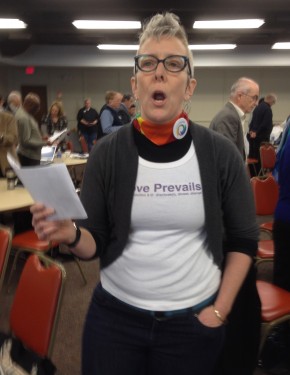At its meeting last summer, the Mississippi Annual Conference of the United Methodist Church urged the UMC’s Connectional Table to significantly shift from its current priorities to more constructive reforms.
Between our denomination’s governing General Conferences, which meet once every four years, the Connectional Table (CT) is the top leadership gathering in United Methodism. Its membership consists of representatives from about every major UMC leadership structure: the Council of Bishops, our denomination’s general agencies, and our regional jurisdictions (in the United States) and central conferences (overseas).
The CT began the 2013-2016 quadrennium with profound disappointment hanging over it from the 2012 General Conference. The CT had submitted a huge proposal to massively restructure the UMC’s top-heavy denominational hierarchy, especially our general agencies. The CT saw that General Conference overwhelming adopt an alternative restructuring proposal, which drew many elements from the CT plan but was largely driven from outside of the CT, only to subsequently see that plan judicially invalidated by the Judicial Council. It is widely understood that the standard the Judicial Council used to strike down the “Plan UMC” approved by General Conference would have also invalidated the CT’s original plan.
Since then the CT, under the leadership of Bishop Bruce Ough of the Dakotas-Minnesota Area, has taken a bit of a different direction. So far, it seems that the top two agendas the majority of the internally divided CT is seeking to promote at the next General Conference are (1) liberalizing the denomination’s current support for biblical standards of sexual self-control and (2) trying again for the so-called “Global Segregation Plan” to create a U.S.-only central conference and dramatically limit the influence of orthodox African United Methodists in our denomination. The latter, which is heavily pushed by those who see it as a means to liberalize at least the U.S. portion of our global denomination on homosexuality and other matters, has clearly been a priority of the CT leadership since their first meeting of the 2013-2016 quadrennium.
But the 2014 session of the Mississippi Annual Conference voted to send a letter to each current CT member urging them to abandon time-wasting attempts to re-introduce the already twice-rejected proposal for a U.S.-only central conference. Mississippi United Methodism is officially urging the CT to instead promote efficiency, accountability, missional alignment, and proportional representation for our denomination’s global regions in leadership structures. In the resolution’s own words, the following principles should shape any restructuring proposal the CT brings to the next General Conference:
- Representation on all denominational boards and agencies should be proportionally distributed among jurisdictions and central conferences based on membership;
- There should be no segregation of the church in the United States from the whole denomination in doctrine, nor should the U.S. be established as a separate central conference;
- The denominational bureaucracy should be streamlined and simplified both for efficiency and cost reduction; and
- The proposal should seek to increase a culture of covenant accountability and alignment with our mission of making disciples of Jesus Christ for the transformation of the world.
The petition was submitted by Pastor Garry Ruff.
The 2014 Mississippi Annual Conference also adopted another petition, from Pastor Mike Childs, to formally require the CT’s composition to be distributed more proportionally to the varying membership of different UMC regions.
IRD/UMAction has repeatedly documented the longstanding pattern of how African United Methodists (the most theologically orthodox region of our global denomination) have, in proportion to their large membership, been dramatically under-represented in denominational leadership (general agencies as well as the Council of Bishops), while the Southeastern Jurisdiction (by far the most conservative of the five U.S. jurisdictions) has often also been under-represented and the tiny, radicalized U.S. Western Jurisdiction is indefensibly over-represented.
At its last few meetings, the CT has shown great willingness to accommodate, pander to, and even completely re-arrange its schedule for Love Prevails, a self-described “radical sexual liberationist” group which has no official standing in the denomination. The stated goals of Love Prevails include disrupting church leadership meetings and urging people to divest their presence, gifts, and even prayers from the UMC.
Is the leadership of the Connectional Table interested in the concerns of others, such as the nearly 180,000 United Methodists in the Mississippi Annual Conference?
The CT begins its fall meeting today.





Comment by bostic on November 5, 2014 at 9:47 am
Thank you Mississippi!!!!!
Comment by Noel Weymouth on November 5, 2014 at 5:19 pm
Suggested photo caption:
“Want to know why your friends have left the UM church?”